Olive Oil Health Benefits – 2025 Update
A closer look at the powerful,...
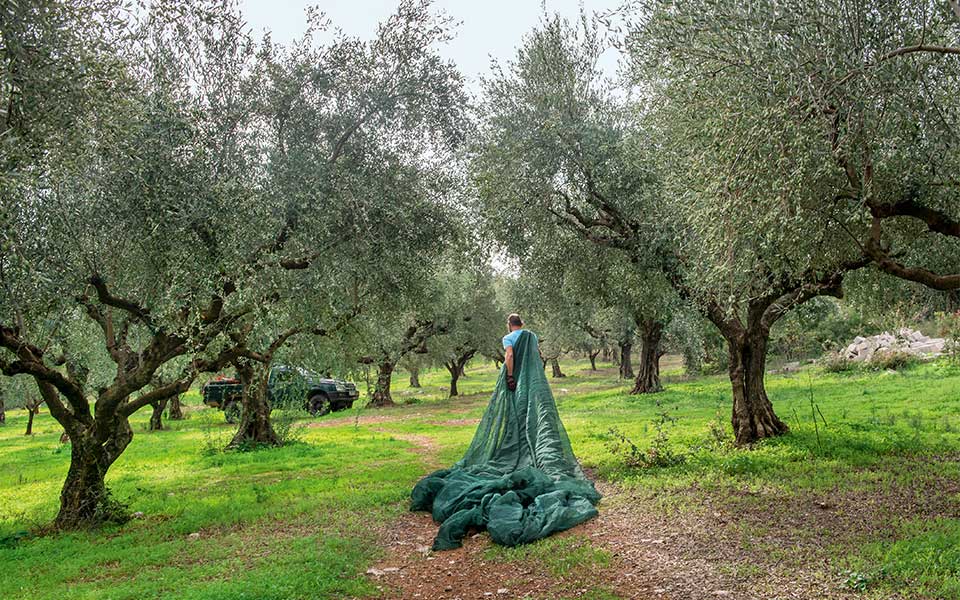
Every autumn, large nets are placed under the olive groves of Messinia to gather the olives. From the estate of Thanasis Kyriazopoulos.
© Penelope Thomaidi/Hans Lucas
It’s no coincidence that Messinian olive oil has gained international acclaim. Messinia and the neighboring region of Laconia are lands that have historically supported olive growing due to the majority of the region being covered by plains, low mountains, and hills.
Messinian olive groves are among the oldest in Greece, with approximately 15 million olive trees, primarily of the Koroneiki variety, which are used to produce olive oil. This olive variety is found throughout the Peloponnese, particularly in the region of Messinia. “The Koroneiki olive variety consistently yields olive oil of excellent quality. Its resilience to pests and disease agents contributes to the superior quality of its oil, something that was particularly important in the past when today’s plant protection methods didn’t exist”, says agriculturalist George Kostelenos, a leading researcher involved in the study and protection of Greece’s olive tree varieties. “In addition, the Koroneiki variety is very prolific, and the olive oil produced from it in Messinia and other parts of the Peloponnese, as well as in Crete, has gained global recognition. Archaeological findings show that Messinia has a long history of olive oil production dating back to antiquity. Such findings, like the large earthenware olive oil jar discovered at Nestor’s palace that is now on display at the Archaeological Museum of Pylos, attest to the rich history of the region’s exceptional olive oil”, he adds.
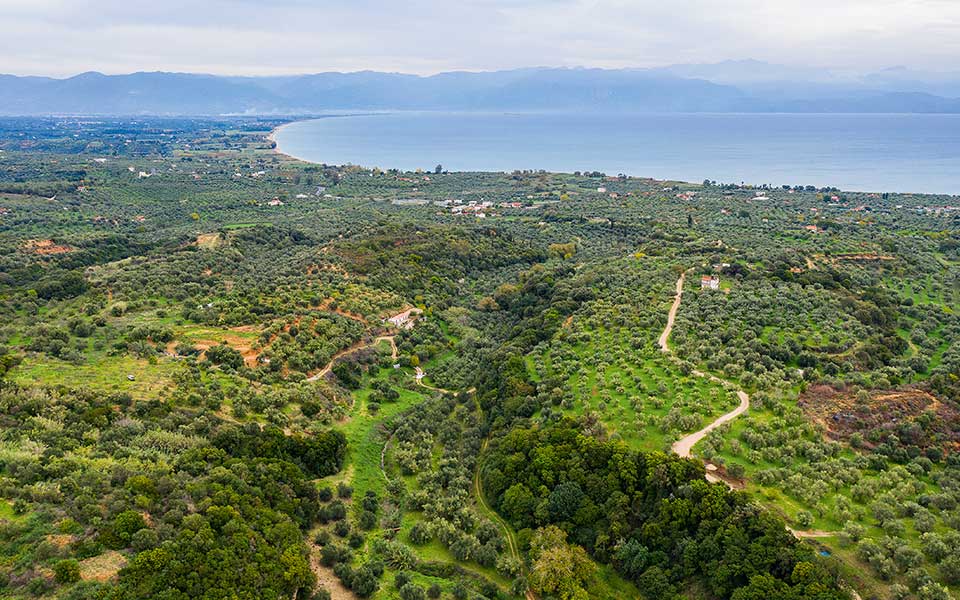
The Messinian Gulf from above, with its olive groves dominating the landscape.
© Penelope Thomaidi/Hans Lucas
It should come as no surprise, therefore, given Messinia’s long history of olive oil production, that the Kalamata Olive Oil Taste Laboratory of the University of the Peloponnese – which was established in 2011 on the initiative of Associate Professor of Agriculture Vasilis Demopoulos and Anna Milioni, the Laboratory’s Quality and Communications Manager – is located there. It is the only one of Greece’s three internationally accredited laboratories that runs under the direction of a university and is recognized by both the Hellenic State and the International Olive Council. The laboratory’s aim is to provide producers, organizations in charge of standardization, and consumers with information about olive oil, ranging from the category to which it belongs to its taste, whether its bitter or sweet, its aroma, etc. It also identifies defects, thereby protecting consumers. “Taste analysis is the touchstone for determining the quality of olive oil”, notes Anna Milioni. “In Greece, we have only recently started to recognize the gastronomic and gustatory diversity of our olive oil varieties.”
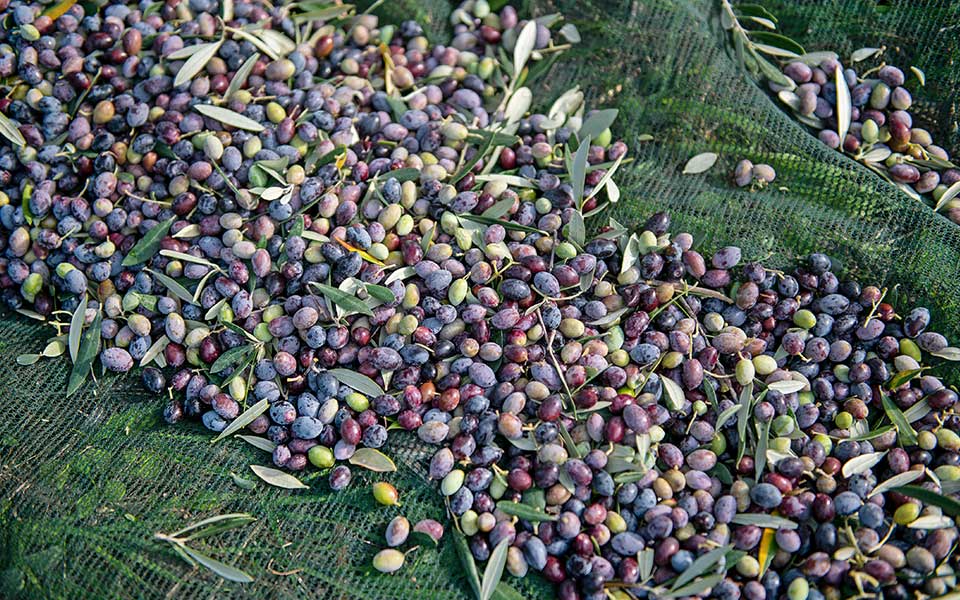
Kalamon PDO olives. A mix of unripe and semi-ripe olives lay on nets under olive trees. Ripe olives are plump and almond-shaped, with a dark purple color and juicy flesh.
© Penelope Thomaidi/Hans Lucas
Increased interest in olive oil tasting has prompted many Messinia estates and olive mills to invest in olive tourism, a term coined in Spain in 2002 to describe a range of travel activities and services related to olives and olive oil. The variety of experiences available to visitors interested in learning about the diverse world of olive oil is fascinating.
The traditional Skarpalezos olive mill, located in the Messinian Mani settlement of Malta, operates Greece’s only olive press that uses granite millstones. The Skarpalezos family has owned the olive mill for five generations, dating back to 1765. Although the 150-year-old millstones are now operated mechanically, olive processing has been carried out in the same manner for centuries. “Olives are crushed mechanically, with the use of cold pressure applied on the mats, without any thermal processing”, explains Marinos Vreteas, the mill’s manager. 99% of the olive oil produced at the mill (25-30 tons) is exported. The remaining 1% is available for purchase in Greece through the mill’s online store. The majority of their output is organic. A smaller portion is naturally scented with fresh ingredients like lemons, garlic, hot pepper, and aromatic herbs. Every Monday through Saturday, by appointment, the Skarpalezos olive mill welcomes visitors from all over the world, who are amazed, as Marinos Vreteas says, “by the production process. Τhey can also take part in olive oil tastings offered by qualified staff members. We are fully committed to our traditions, which we preserve tooth and nail, despite the difficulties and obstacles that we face”, he concludes.
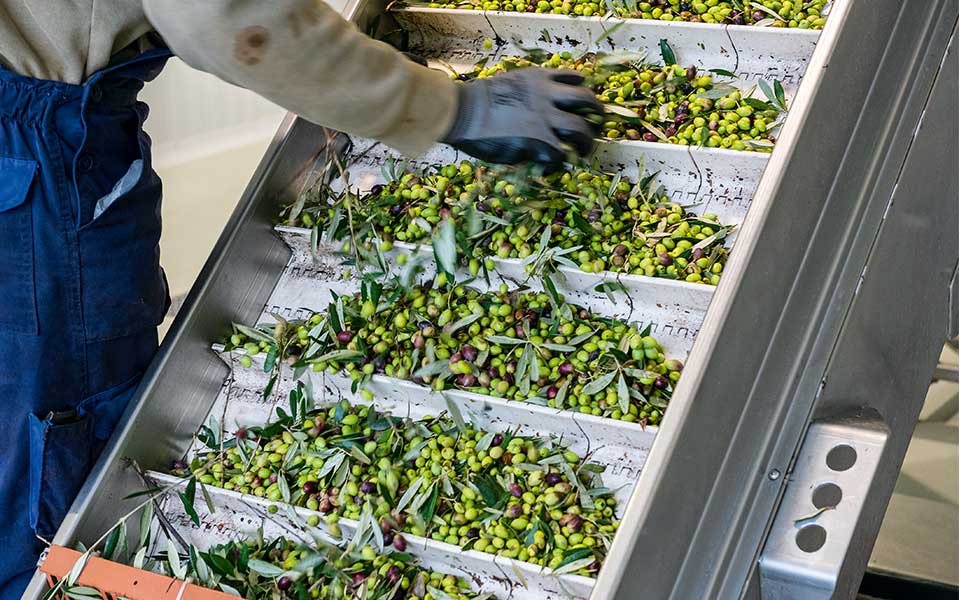
Once the olives have been harvested and any twigs and leaves have been removed, they are sorted according to size and washed.
© Penelope Thomaidi/Hans Lucas
The Ben Olive Mill olive tourism facility, run by Pavlos Kaplanis, the grandson of original founder Stavros Benakopoulos (after whom the mill is named), can be found in the village of Parapougi, 45km north of Kalamata, in a virtually untouched, virgin location. “Olive tourism is an experience that has been attracting foreign tourists almost exclusively”, says Pavlos Kaplanis. “Messinia is filled with olive groves, so the landscape inspires visitors to explore these experiences.” The Ben Olive Mill estate produces exclusively organic olive oil, using a traditional olive press.
In autumn, the mill offers guided tours of the harvesting and production process, as well as olive oil tasting sessions. “This is the most interesting part of the tour”, says Pavlos Kaplanis, “because visitors are free to ask questions depending on their experience, enjoy themselves, taste local dishes and see for themselves how they are all prepared using olive oil. Some visitors have never seen olives and olive trees before, while others join the tour to learn more about them from experts. The experience we offer is unique to each visitor”, he adds.
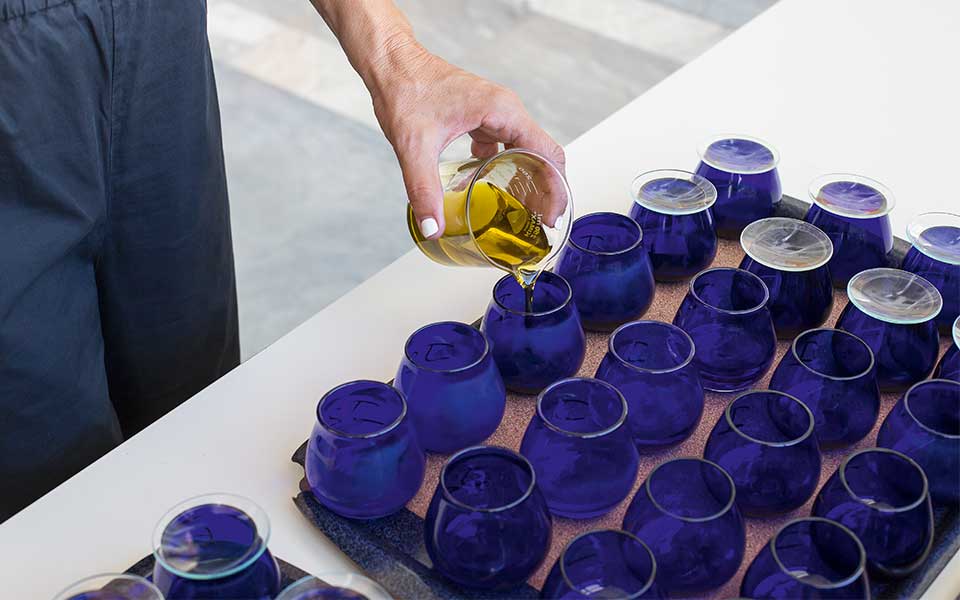
Olive oils from all over Greece arrive at the Kalamata Olive Oil Taste Laboratory of the University of Peloponnese, where the laboratory’s team examine and evaluate their taste.
© Penelope Thomaidi/Hans Lucas
Before we head down to Messinia, we can get our first taste of Messinian olive oil at Maison d’Olive, an olive oil cellar-boutique deli in the center of Athens. “It is the only oil ‘cellar’ in Greece, hosting more than 180 olive oils that have won awards in International Competitions”, explains owner Areti Sougari. At Maison d’Olive, one can also find the top Messinian olive oils, take part in olive oil tastings, and learn about food pairings. Maison d’Olive was created by Areti Sougari’s husband, Constantin Potou, whose family, on his mother’s side, has a long tradition in the production of olive oil in Messinia. Constantin Potou is a seventh-generation olive grower, who still produces and standardizes the olive oil of his family’s estates, most of which is of the Koroneiki variety, in the Messinian towns of Gargalianoi and Mikri Mantineia. He also produces select olive oils for other producers, always to his own specifications.
The olive oils Constantin Potou produces from the Koroneiki olive variety are high-phenolic and certified in accordance with Commission Regulation (EU) 432/2012. They have won numerous awards at prestigious international competitions, most notably for the Potou Premium and Melan Premium Koroneiki PDO olive oils, which are primarily exported abroad. Constantin Potou had to convince his family and other olive growers who are members of the “Mikri Mantineia and Avia Kalamata PDO Cooperative” that, in order to produce premium olive oil, they needed to change when and how olives were harvested, as well as how olive oil was extracted. “The hardest part was the transition from the old ways of oil production, which, despite being wrong, had been perpetuated for reasons of survival”, explains Constantin Potou. “Today, the added value of our products is what makes us stand out abroad. We must create the ‘Rolls Royce’ of olive oils because we cannot compete with nations like Spain in terms of price or quantity.”
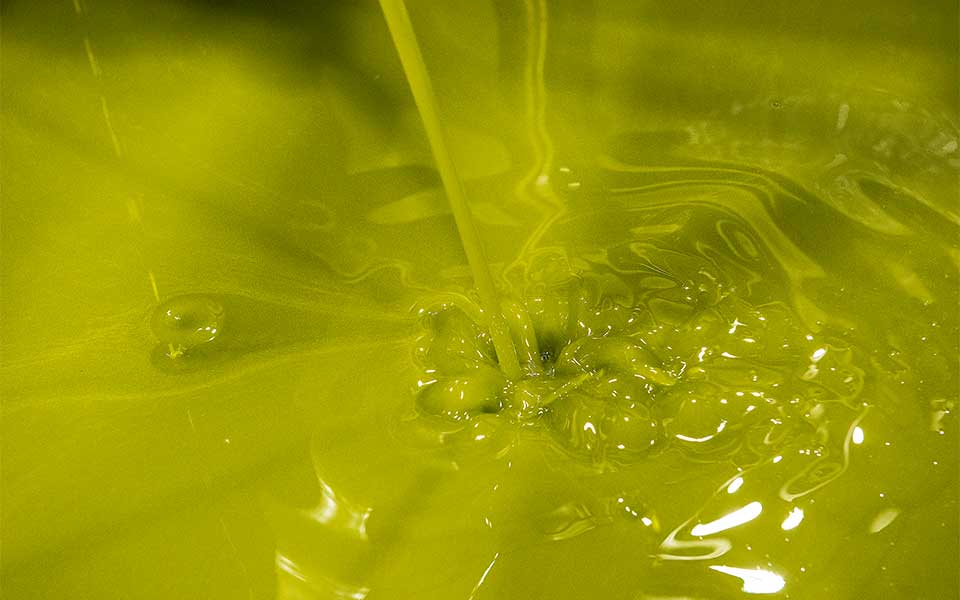
The extra virgin early harvest olive oil that is produced from unripe Koroneiki olives has a golden green color, a shiny texture, and an exceptional aroma. It is considered one of the finest olive oils in the world.
© Penelope Thomaidi/Hans Lucas
Kalamata-based Anastasis Magganas, the young owner of the Monogram estate and producer of several award-winning extra virgin olive oils, emphasizes the importance that younger producers place on packaging. Monogram olive oils, particularly the monovarietal olive oils that carry the characteristic “M” monogram, are inspired by Odysseas Elytis’s collection of poems of the same name. They have won awards for their simple yet elegant packaging, like that of their organic Koroneiki monovarietal early harvest olive oil. Monogram’s packaging combines elegant aesthetics with targeted information. The labels include information about the contents of the bottle as well as tasting and pairing suggestions, so customers know what they’re buying and why. The packaging is also environmentally friendly, with a paper, rather than plastic, label and box.
Packaging, when combined with high-quality content, produces exceptional results in competitive foreign markets. “Things in Greece have improved significantly in terms of packaging”, says Anastasis Magganas. “If you want to be competitive in foreign markets, you must make big strides. Countries such as Spain and Italy are way ahead of the curve in terms of promotion and communication in ways with which we are not yet familiar here in Greece. What’s more, the State provides no incentive or support”, he concludes.
According to the data of the Messinian Chamber of Commerce and Industry, there are approximately 460 active oil-producing companies in the Prefecture of Messinia, many of which have won prizes for their products in Greek and international competitions. The selection of producers named in this article is merely indicative and constitutes a small, representative sample.
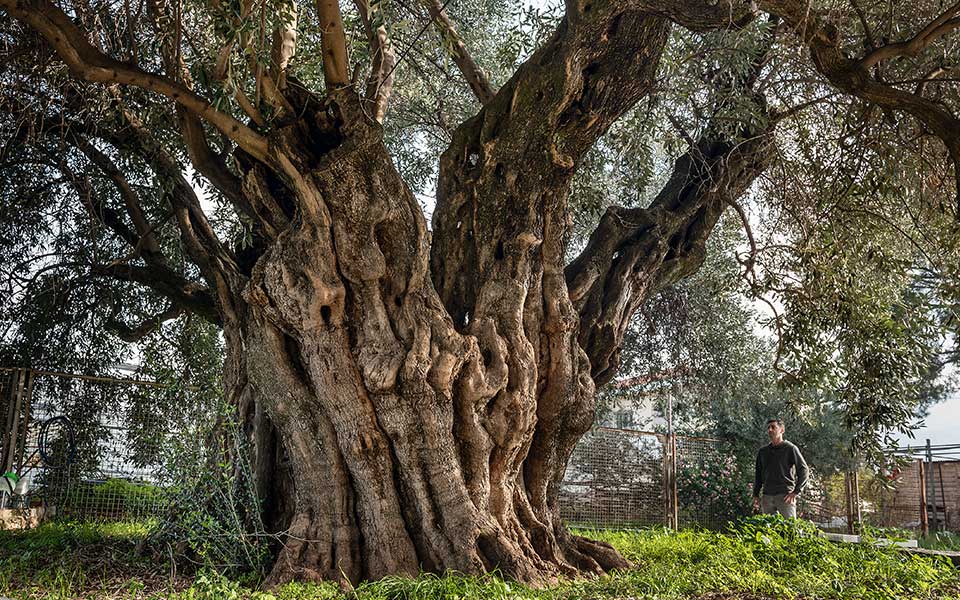
“Mother Olive Tree”, the centuries-old olive tree that is the emblem of Kalamata, is a rare natural monument with a trunk girth of almost 9 meters; its age is between 800 and 1,733 years.
© Penelope Thomaidi/Hans Lucas
George Koutelas, the owner of the Trofopoleio 51 deli in Kalamata, has created a special area for extra virgin olive oil tastings, where customers can learn everything there is to know about the Koroneiki variety. “A Koroneiki olive oil that comes from the coastal area of Messinia has a different aromatic and taste profile from an olive oil that comes from the mountainous region of Messinia due to the differences in soil and microclimate”, he explains.
Like all olive oils, the Koroneiki variety is characterized by three fundamental attributes: it is fruity, bitter, and pungent. But how does one know which dishes pair best with the various kinds of extra virgin Koroneiki olive oils? George Koutelas provides a short practical guide for beginners:
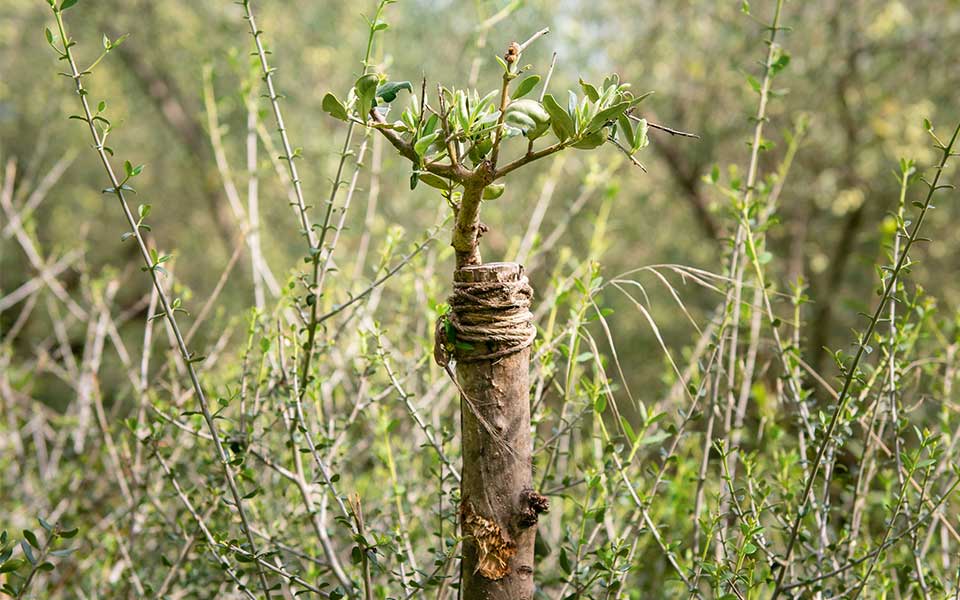
The ancient technique of grafting is used to turn a wild olive tree into one of Messinia’s many prolific varieties.
© Penelope Thomaidi/Hans Lucas
In the past, olives and olive oils were named after the ports from which they were shipped, and this is how they became known internationally. “Kalamata, with its large commercial port, became known all over the world thanks to this circumstance and that’s how the Kalamata olive variety came about”, says George Kostelenos. Like all olives, this particular variety took its name from the port from which it was exported. These olives would reach their destination, for example the USA, packed in bags with the words “Kalamai Port” printed on them – Kalamai being the older name for the modern city of Kalamata – and were therefore believed to have originated exclusively in Kalamata.
The truth, however, is that for many years now Messinia has been producing only a small quantity of these olives, as other regions, particularly Laconia which today produces the vast majority of this olive variety, began cultivating Kalamon olives on a larger scale. And this is something that raises concerns as to their certification as authentic Kalamon PDO olives. In other words, though Kalamata may well be the birthplace of this variety, it is by no means its main producer. Let’s leave this issue to the experts and let’s focus on the quality of this olive. Its reputation as one of the world’s top table olives is not coincidental: it’s not subject to any chemical processing (although it is not the only variety that is not chemically processed) and it has a rich, crisp flesh and a beautiful dark, glossy color.
Archaeological Museum of Pylos, Tel.: (+30) 27230.229.95
Kalamata Olive Oil Taste Laboratory, Tel.: (+30) 27210.453.04
Skarpalezos Traditional Olive Mill, Malta, Messinia, Tel.: (+30) 27210.712.80
Ben Olive Mill, Parapougi, Messinia, Tel.: (+30) 27240.323.71
Maison d’Olive Oil Cellar , 7-9 Xanthipou, Kolonaki, Athens, Tel.: (+30) 210.735.3912
Constantin Potou, Tel.: (+30) 694.712.3680
Monogram, 5 Kosmopoulou, Kalamata, Tel.: (+30) 697.270.8565
A closer look at the powerful,...
A historic hotel redefines modern Greek...
Michiel Bakker, President of the Culinary...
A journey through Greece’s living heritage,...